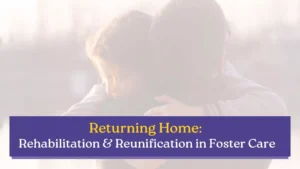When we think of a precious child, we should first start with a definition of the word. Precious translates from a Hebrew word that can mean dear, expensive, costly, heavy, or grievous. We were all created in the image of God, which on its own makes us precious. The reality is that sometimes children with trauma histories don’t act or appear precious—we can see them as defiant, manipulative, oppositional, and difficult. These descriptors are based on the behaviors we observe from them.
What if we were to uncover the behaviors to determine what might be at the root of them? Can we pause and look at behavior as a youth’s language? Can we stop assigning intentionality to all behaviors? Your child really didn’t wake up this morning determined to push your buttons.

Responding To Your Child’s Needs
When a child does not get their needs met early in life, their nervous system is revved up. Then, they might engage in behaviors that may not make sense to us; however, the behaviors are their way of trying to get their needs met. For example, a child who may not be getting his emotional needs met may tantrum or shut down to try and get someone to notice him. They are not acting out to get attention; they are telling us they need attention. They need doses of attention just like they need food, air, shelter, and water. Our children need consistent infusions of directed attention to them, which keeps them feeling safe and regulated.
At times, we can become confused and frustrated as we try to respond to children’s pain and behaviors. We tend to assign intention to their actions. For example, a child might whine and cling to you. Rather than seeing this behavior as trying to manipulate you, what if we paused, made sure we were calm and fully present, and then looked for what the child needed at that moment?
Perhaps the child needs touch to calm them, a kind word that lets them know they are seen and safe, or maybe they need a snack or a time for rest. Sometimes, their needs are physical, while other times, their needs are emotional. Become a detective and investigate your child’s behavior. Remember, look for their preciousness, even when you are struggling. This, my friends, is how God responds to us—with His grace, not with what we deserve. Instead, He responds with what we need. He sees our hearts and doesn’t judge us. Can we try to do the same for our children?
The Need for Safety
An important thing to remember is that children with trauma histories may be coming from a place of fear and anxiety—that someone will hurt or harm them or that their needs won’t be met. These fears are real. Just because you know your child is safe with you doesn’t mean that they feel safe. If this seems confusing to you or you find yourself with more questions than answers, seek out a professional in trauma and child development.
Karyn Purvis, author of The Connected Child, said one thing that has stuck in my brain. She said, “Every child should know they are precious.” Working with adolescent males in residential treatment centers who were taller and bigger than me made it difficult for me to see their preciousness at times. Yet, I knew it was vital for me to shift my perspective. I often said, “I wish you could see yourself as I see you. I see your talents and uniqueness.” No matter their background or pain, they always seemed to lean into those words.

Holding Space for Others
Don’t we all want someone to see us? To hear us? To value us? We aren’t looking for people to fix us; instead, we want people in our lives who know how to hold space for us. Often, I get asked what it means to hold space for others. I’m not sure I have a good response, yet I know when someone does that for me.
In the Book of Job, Job’s three best friends showed up during all his troubles. Job 2:13 says, “Then they sat on the ground with him for seven days and seven nights. No one said a word to him, because they saw how great his suffering was.” Did you read that? They didn’t say a word to him—they didn’t give him advice, didn’t try to fix him, didn’t tell him to repent, and didn’t even say they would pray for him. They sat with him. That is holding space—being present in someone’s pain even when we are uncomfortable. I imagine sitting for seven days without speaking would be very awkward. And yet, they did this for his benefit. We can learn a lot from this.
Holding Space for Your Precious Child
Sometimes the best thing we can ever do is to SHOW UP! You don’t need to show up with answers, resources, or words. Show up with your authentic, flawed self. That gives space for others to be where they need to be. Your child won’t always be angry and call you names. That might be the way they discharge their pain. When we try to get our children to ‘be quiet’ or ‘behave,’ we shut them down and tell them to hold their pain in.
Sometimes, the best thing we can do is provide opportunities to discharge our own pain and for our children to do the same. This can range from throwing rocks into the stream, bouncing a ball against a wall, running, playing basketball, drumming, dancing, or listening to loud music. Our bodies need to metabolize our traumas, and we do that through movement. Think about how you pace on a stressful phone call. Pacing is one way to calm and settle our brains and nervous systems. Our bodies are wired to move, and it is through movement that we can discharge our pain, grief, and trauma.

Are You Struggling To See Your Child As Precious?
If you find yourself struggling to find the preciousness of your child, maybe it’s time to reach out. Find someone who will walk with you, not trying to advise or fix you. Perhaps someone in your church, a family member, another parent, or even a therapist will be there for you.
Process your confusion, anxiety, or fear with someone you can trust as you do your own healing. Come from your scars, not your wounds. Do what you can to heal so that you can create healing opportunities for the children in your lives. Remember, when you find yourself activated by your child’s behaviors, it might signal that something in your life needs attention. Don’t be afraid to do your own work; you deserve it, and those in your life need you to be your best self. And that, my friends, is how you let your child know they are precious.
















